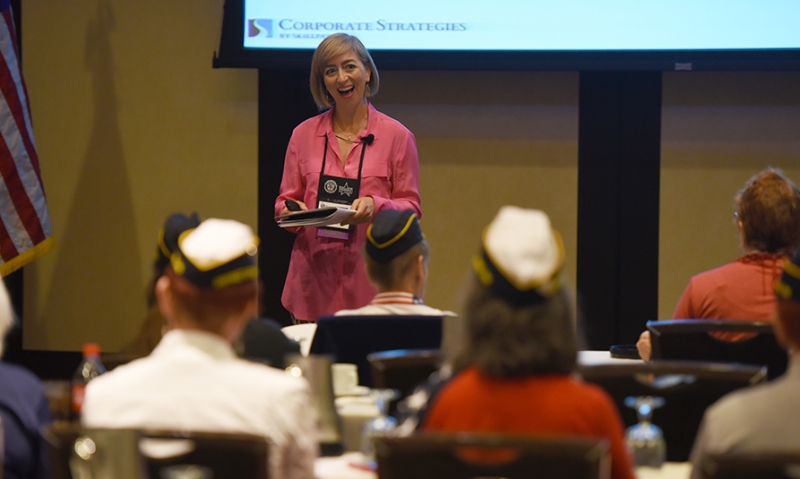
Growing in order to continue giving
More than two dozen women veterans were given a course in mentoring, financial literacy, professional growth and development, and physical fitness during The American Legion’s first annual Conference for Women Aug. 21 at the Legion’s national convention in Reno.
SkillPath’s Kasmira Kit, a U.S. Marine Corps veteran, provided the three-hour training session. “I truly believe there is no limit to what we can do as women to serve our country, whether on active duty or beyond,” said Kit, who will soon join the Army National Guard. “I’m also honored to spend time with a group of people committed to their own self-improvement (and) their own development as people. We cannot continue to give if we cannot continue to grow.”
Kit then broke her presentation into four areas, making time during each for a back-and-forth session with the conference attendees.
Mentoring
One of the ways to continue to grow, Kit said, is through a mentorship relationship. She went over the fundamentals of mentoring, which she said should be goal-oriented, motivating, an opportunity for professional growth and beneficial to both parties.
“When we go into the relationship, there should be goals on the mentee side,” Kit said. “What do you want to get out of it?”
Kit said a person should not be both a boss and a mentor, nor is a mentor someone who will hold a person’s hand and walk that person through their career. “It shouldn’t be a counseling session,” she said. “This is a professional relationship. There will be times when personal situations will come into play. But if we can remember that … the goal is a professional relationship, that will help us keep that mentor relationship really focused on the goal.”
Financial Literacy
Kit said it’s sometimes difficult to bring up the topic of money because people tend to attach it to their self-worth, “or, are we good people. I encourage you to separate that as we talk about this.”
She said 49 percent of all Americans live paycheck to paycheck, and that 52 percent of men and 69 percent of women cannot cover six months of expenses. “It’s actually recommended you have eight to 12 months of expenses backup,” Kit said, noting women on average make 80 percent of what their male counterparts make.
Getting a person’s finances in line is critical. “We can’t be effective in serving our community, our organizations or ourselves if we’re worried about money,” Kit said. “We’ve all been in that situation at some point. When you’re there, you’re not thinking about being a mentor or a mentee, or serving in any kind of capacity.”
Kit said setting up a budget is a logical first step and provided a guide to doing so: establish a monthly income; establish fixed monthly expenses; establish variable expenses, such as clothing and entertainment; review income vs. expenses; and keep a record of both spending and expenses.
Treat a savings plan as a bill and always pay it first, Kit advised, and don’t set up a budget with unrealistic goals. “The reason that budgets fail often are like the reason a diet fails,” she said. “You might be trying to cut too much too soon. And you have a great plan but don’t execute the plan, then nothing happens.”
Professional Growth and Development
One of the keys to professional growths in relationships, and a key to building and keeping relationships is the ability to respectfully disagree. Kit said that honesty is a good start – especially when admitting fault – and that relationships are more important than single wins.
“In a win-win relationship, the key is that both parties felt understood, heard (and) validated as individuals,” Kit said. “It’s not that both people get what they want. That’s almost never possible. Everybody gets a little bit of something that they want.”
Kit also provided tips on mending relationships, again pointing to being honest and direct, as well as dealing with the situation openly and fairly.
Physical Fitness
Kit said there is no greater asset to a women wanting to provide service than her health. “And not just our physical health, but our mental health, our emotional health and our spiritual health,” she said.
Kit presented an energy pyramid comprised of four levels: physical (the base), emotional, mental and spiritual (the top). Without physical energy “we cannot do anything,” Kit said. “If we don’t take care of ourselves … nothing else follows.”
The emotional piece reflects the quality of energy, Kit said, while the mental part includes focus and creativity. Both need to be replenished from time to time, she said.
The spiritual energy “does not have to be a religious practice,” Kit said. “It’s more about your values, which may come from your religion or may not.”
